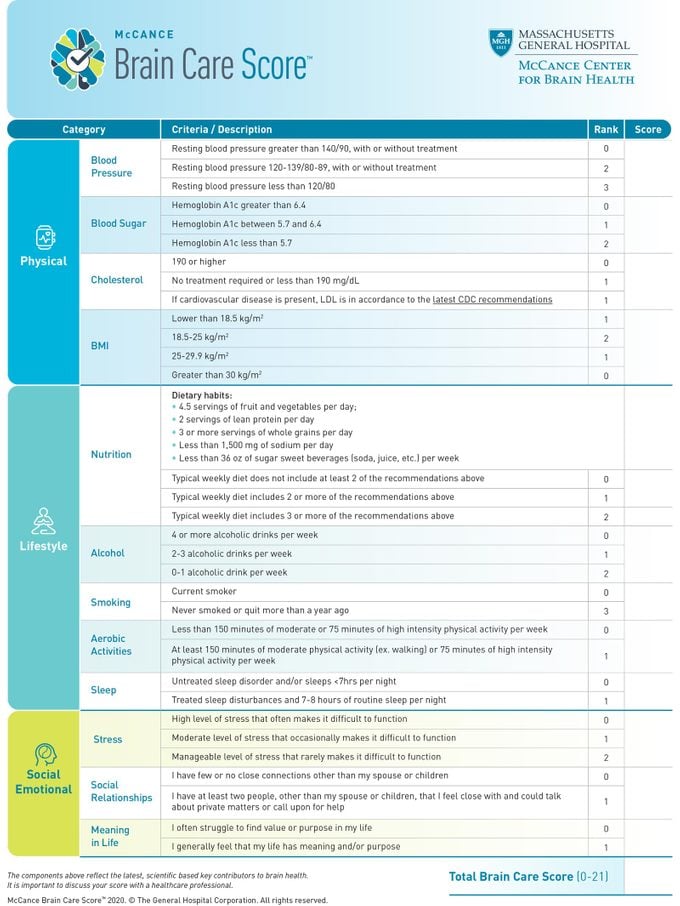How High Is Your Alzheimer’s Risk? Doctors Say This 3-Minute Test May Reveal Your Chances of Dementia and Stroke
Updated: Jun. 09, 2024

The new McCance Brain Care Score from a Harvard-associated health system can provide reassurance, or maybe a few tweaks, to keep your brain functioning at full capacity.
Maybe you’ve heard that dementia risks are rising, and multiple variables can impact your risk…but without brain scans, the recent Alzheimer’s blood test, or other diagnostic testing, it’s usually tough to know how concerned you should be about your own risk of developing a life-altering condition like dementia or stroke.
New research at the McCance Center for Brain Health at Massachusetts General Hospital found that lifestyle factors are major contributors to the long-term wellness of your brain. In fact, they’ve just developed a short questionnaire that can help assess your chances of staying sharp into your later years.
The McCance Brain Care Score (BCS) is divided into three categories for a total of 12 questions. The tally of your answers to these questions will give you a brain health score that can assess if you are doing enough to prevent conditions that lead to unhealthy brain aging. The three categories are Physical, Lifestyle, and Social/Emotional. “Higher scores suggest better brain care,” reports Harvard University‘s blog.
- The Physical category includes your average blood pressure readings, your blood sugar represented by HbA1c levels, total cholesterol, and body mass index (BMI).
- The Lifestyle category takes into account how well you adhere to established nutrition guidelines, average alcohol intake, smoking habits, sleep habits, and exercise frequency.
- The last category, Social/Emotional, assesses stress levels, your social support system, and your overall outlook on life.

Still, the brain care scorecard appears to have merit. A study in the journal Frontiers in Neurology, published in December 2023, used the tool to assess the potential for dementia and stroke for about 400,000 participants from the UK Biobank. The researchers found the following, as reported by an executive editor for Harvard:
- Participants younger than 50 at the study’s start were 59% less likely to develop dementia and 48% less likely to have a stroke with each five-point higher score on BCS.
- Participants 50 through 59 at the study’s start were 32% less likely to develop dementia and 52% less likely to have a stroke with each five-point higher score on BCS.
- After age 59, the five-point increase seemed to yield an 8% lower chance of developing these conditions.
“It’s a real service that the researchers have developed a scale like this,” said Andrew Budson, MD, a professor of neurology at Harvard Medical School, in a recent post on the university’s health blog. “It’s really wrapping together health factors everyone has known for a number of years in new packaging.” Dr. Budson and his colleagues advocated for the addition of questions assessing outlook on life or finding meaning. “Once you have a purpose, then you have a reason to follow through with assessing all the other items on the BCS scale and seeing what you can do so you’ll be around longer, and be competent and capable longer, to help fulfill the meaning and purpose of your life,” Dr. Budson noted.
Overall, the researchers at the McCance Center hope that the Brain Care Score will open a dialog between a person and their provider. They note that paying attention to the overall score and making “small adjustments” like walking more often or nurturing close relationships can make a noticeable difference. “Over time we are confident that regular tracking of your brain care score will lead to optimal brain health throughout your life,” the research team says


















